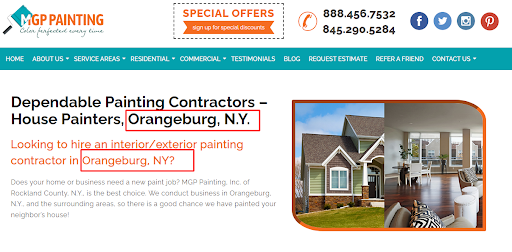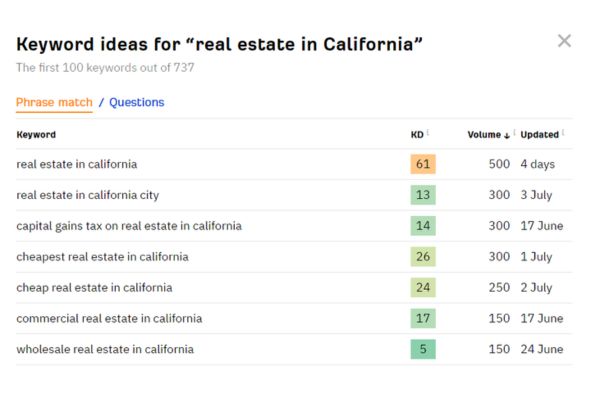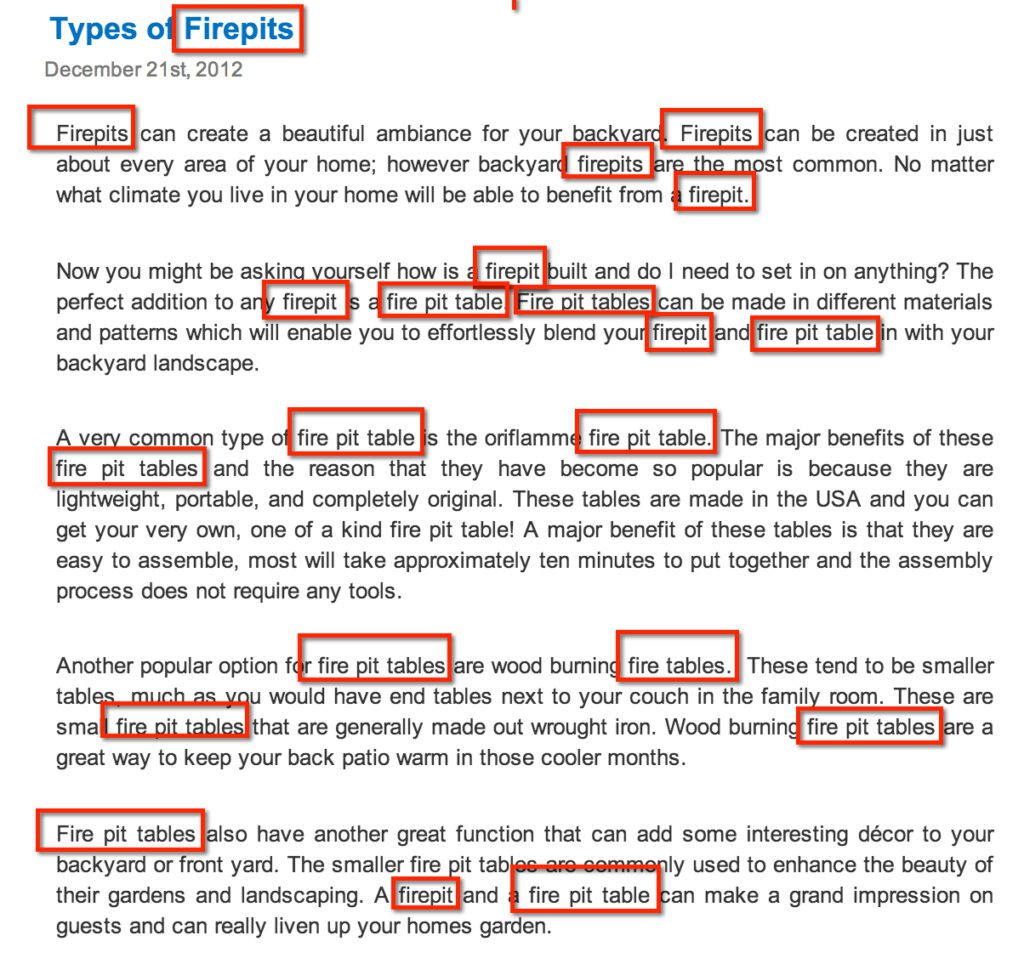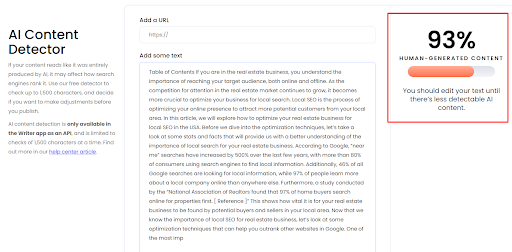If you are in the real estate business, you understand the importance of reaching your target audience, both online and offline. As the competition for attention in the real estate market continues to grow, it becomes more crucial to optimize your business for local search. In this article, we will explore how to optimize your real estate business for local SEO in the USA. Before we dive into the optimization techniques, let’s take a look at some stats and facts that will provide us with a better understanding of the importance of local search for your real estate business.
According to Google, “near me” searches have increased by 500% over the last few years, with more than 80% of consumers using search engines to find local information.
Furthermore, a study conducted by the “National Association of Realtors found that 97% of home buyers search online for properties first. [Reference]” This shows how vital it is for your real estate business to be found by potential buyers and sellers in your local area.
How to Optimize Your Real Estate Business in the United States for Local SEO?
Now that we know the importance of local SEO for real estate business, let’s look at some optimization techniques that can help you outrank other websites in Google.
1. Claim Your Google My Business Listing

One of the most important steps in optimizing your SEO for real estate agents in the USA is to claim your Google My Business listing. This is an essential tool that can help you appear in Google Maps and local search results, which can significantly boost your online visibility.
According to a recent study by Google, businesses that have verified their Google My Business listing are twice as likely to be considered reputable by customers.
To claim your Google My Business listing, you need to follow a few simple steps. Visit Google My Business first, then log in with your Google account. You’ll need to make one if you don’t already have one. Once you’re logged in, you can search for your business and see if it already has a listing.
If your business is already listed, you can claim it by clicking on the “Own this business?” button. Google will then verify your ownership of the business by sending a postcard to your business address. Once you receive the postcard, you can enter the verification code on your Google My Business dashboard, and your listing will be verified.
If your business isn’t already listed, you’ll need to create a new listing by clicking on the “Add your business to Google” button. You’ll be prompted to provide some basic information about your business, including your name, address, phone number, and website. It’s important to provide accurate and consistent information across all your online profiles, including your Google My Business listing. This helps Google and other search engines understand that your business is legitimate and trustworthy, which can improve your search rankings.
In addition to providing accurate information, you should also optimize your Google My Business listing by adding photos, videos, and other content that showcases your business. You can also encourage your customers to leave reviews on your listing, which can further improve your visibility and reputation. By claiming and optimizing your Google My Business listing, you can improve your local search rankings, establish trust with your customers, and showcase your business to potential clients. It’s a simple and effective step that can have a big impact on your online success.
2. Optimize Your Website for Local Search

Optimizing your real estate business’s website for local search is a crucial part of your digital marketing strategy. In today’s competitive online landscape, it’s not enough to have a website you need to ensure that it’s optimized for local search to attract potential clients in your area.
According to a study by Google, 46% of all Google searches are seeking local information, and 88% of consumers who search for a local business on their mobile device call or visit that business within 24 hours.
To optimize your website for local searches, you need to focus on several key areas. Here are some of the most important steps you can take:
1. Include Location-Specific Keywords: Use location-specific keywords throughout your website’s content, including your page titles, meta descriptions, and headings. This will help search engines understand the geographic location of your business and display it in local search results. 
2. Use Schema Markup: Search engines can better understand the information on your website thanks to a type of structured data called schema markup. By adding schema markup to your website, you can provide additional information about your business, including your address, phone number, and hours of operation. 
3. Build Local Backlinks: Backlinks from other local websites can significantly boost your website’s local search rankings. Reach out to local businesses, organizations, and directories to see if they’re willing to link back to your website.
4. Create Location-Specific Pages: If you have multiple locations, create a separate page for each one and include location-specific information, such as your address, phone number, and hours of operation. This will help search engines understand the geographic relevance of your business and display it in local search results. 
5. Use Google Analytics: By tracking your website’s performance using Google Analytics, you can gain valuable insights into your website’s traffic, including how visitors are finding your website and what pages they’re visiting. By following these key steps, you can optimize your local SEO for realtors, attract potential clients in your area, and stay ahead of the competition.
3. Use Local Keywords in Your Content

Using real estate SEO keywords in content is an essential part of optimizing it for local SEO. By incorporating local keywords into your website’s content, you can help search engines understand the geographic relevance of your business and display it in local search results.
Here’s how you can use local keywords to improve your real estate SEO rankings:
1. Identify Local Keywords: The first step in using local keywords in your content is to identify them. Use tools like Google Keyword Planner, Moz Keyword Explorer, and Ahrefs to find relevant local keywords that potential clients in your area are searching for.
Examples of local keywords may include “real estate agent in [city name],” “[city name] homes for sale,” and “[city name] real estate market.”
2. Include Keywords in Your Page Titles and Meta Descriptions: Once you’ve identified your local keywords, incorporate them into your website’s page titles and meta descriptions. This will help search engines understand the geographic relevance of your business and display it in local search results.
3. Use Keywords in Your Headings and Content: In addition to your page titles and meta descriptions, use local keywords in your website’s headings and content. This will help search engines understand the topics covered on your website and display it in local search results.
4. Avoid Keyword Stuffing: While it’s important to use local keywords in your content, avoid keyword stuffing, which is the practice of adding too many keywords to your content in an attempt to manipulate search engine rankings.

Image Source: Contentwriters
Keyword stuffing can result in a penalty from search engines and hurt your website’s rankings.
5. Use Natural Language: Use local keywords in a natural and organic way that sounds natural to readers. Your content should be helpful and informative, and local keywords should be used to enhance the overall message, not to distract from it.  By using local keywords in your website’s content, you can optimize your SEO for real estate websites and attract potential clients in your area. Remember to use local keywords in a natural and organic way and avoid keyword stuffing to ensure that your website’s content is valuable and informative.
By using local keywords in your website’s content, you can optimize your SEO for real estate websites and attract potential clients in your area. Remember to use local keywords in a natural and organic way and avoid keyword stuffing to ensure that your website’s content is valuable and informative.
4. Get Listed in Local Directories

Getting listed in local directories is an important part of optimizing your real estate business for local search. By getting your business listed in local directories, you can improve its online visibility and attract potential clients in your area.
Here’s how you can get listed in local directories:
1. Identify Local Directories: The first step in getting listed in local directories is to identify them. Use search engines to find local directories in your area, and check to see if your business is already listed.

2. Claim and Verify Your Listings: If your business is already listed in local directories, claim and verify your listings. This will ensure that the information about your business is accurate and up-to-date. If your business is not listed, create a new listing.
3. Keep Your Information Up-to-Date: Once you’ve claimed and verified your listings or created new ones, make sure to keep your business information up-to-date. This includes your business name, address, phone number, and website. 
4. Add Photos and Descriptions: To make your listings stand out, add photos and descriptions that showcase your business. This will help potential clients learn more about your business and choose you over competitors.
5. Monitor and Respond to Reviews: Local directories often allow users to leave reviews of businesses, which can influence potential clients’ decisions. Monitor and respond to reviews to show potential clients that you care about their experiences and are committed to providing excellent service. 
By getting listed in local directories and following these tips, you can improve your real estate business’s online visibility and attract potential clients in your area. Make sure to keep your business information up-to-date, add photos and descriptions, and monitor and respond to reviews to maximize the impact of your listings.
5. Use Social Media to Promote Your Business

Social media has become a powerful tool for businesses to promote their products and services. As a real estate business, you can use social media marketing to build your brand, attract potential clients, and establish yourself as a thought leader in your industry.
Here are some tips on how to use social media to promote your real estate business:
1. Choose the Right Platform: There are several social media platforms available, including Facebook, Instagram, Twitter, and LinkedIn. To maximize your impact, choose the platform that is most popular among your target audience.

For instance, Facebook and Instagram are popular among millennials, while LinkedIn is more suitable for professional networking.
2. Create High-Quality Content: To attract potential clients, create high-quality content that showcases your business and your expertise. This includes posts about your latest listings, informative blog posts, and videos that showcase your properties.
3. Engage with Your Followers: Social media is a two-way conversation. Engage with your followers by responding to their comments and messages, and by sharing their posts. This will help you build a loyal community of followers and increase your reach.
4. Use Hashtags: Hashtags are a powerful tool for reaching new audiences on social media. Use relevant hashtags in your posts to make it easier for potential clients to find your content.

5. Run Paid Ads: If you want to reach a larger audience, consider running paid ads on social media. This will allow you to target potential clients based on their interests, demographics, and location. By using social media to promote your real estate business, you can build your brand, attract potential clients, and establish yourself as a thought leader in your industry. Choose the right platform, create high-quality content, engage with your followers, use hashtags, and run paid ads to maximize your impact.
Conclusion
Optimizing your real estate business for local SEO is crucial for attracting potential buyers and sellers in your local area. By following the techniques outlined above, you can improve your online visibility and outrank other websites in Google. Remember, local SEO for real estate is an ongoing process that requires regular updates and maintenance to ensure that your business stays visible to your target audience.

